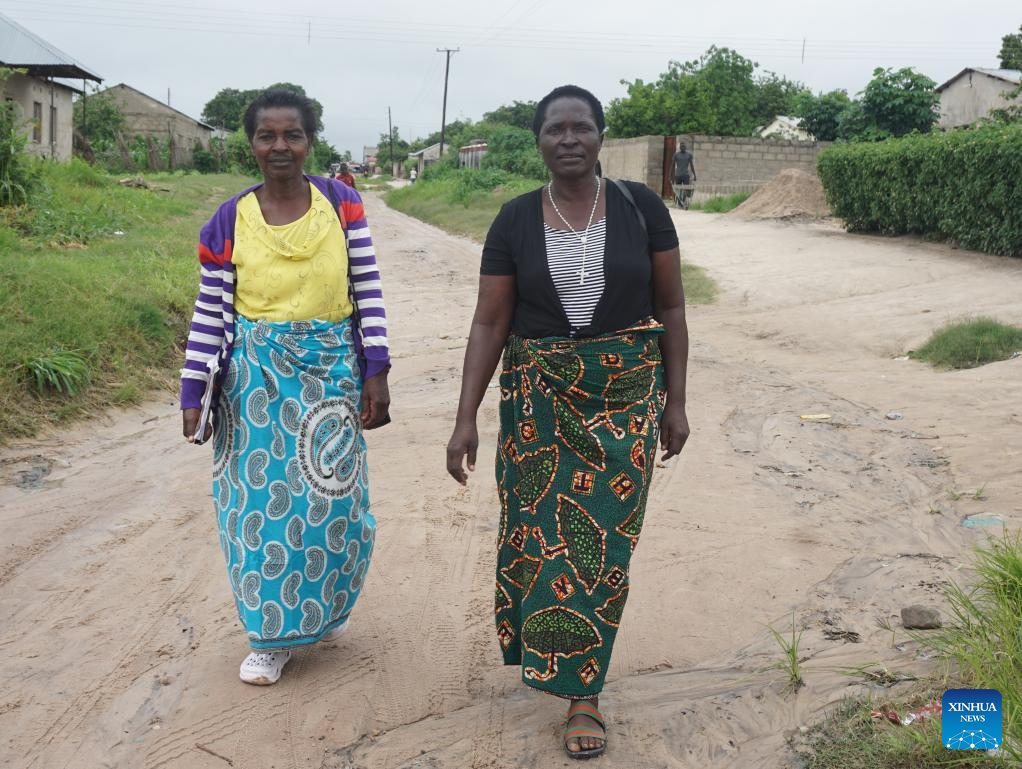
Community health volunteers Alice Sakala (L) and Doris Chanda walk home after conducting a Cholera sensitization activity in Kapiri Mposhi, Zambia, Jan. 20, 2024. (Photo By Lillian Banda/Xinhua)
LUSAKA, Jan. 28 (Xinhua) -- As cholera continues to be a health challenge in Zambia, community health volunteers in different parts of the country are working hard to educate the public about preventing the disease from spreading.
In Zambia, community health volunteers are ordinary members of the public who have undergone training in basic health care management and community mobilization.
Most community health volunteers are found in low-income communities in rural and peri-urban areas of the country as well as in densely populated settlements. These volunteers serve as a link between health facilities and the community and often offer their services free of charge. In some cases, they are given equipment such as bicycles to ease transport challenges.
"My job is to see to it that people in my area get the information they need to prevent getting sick from cholera. As they say, prevention is better than cure," said an enthusiastic Alice Sakala of Kapiri Mposhi, a town in central Zambia.
Sakala, 63, a resident of Kapiri Mposhi's Riverside Compound, a densely populated low-income area, is among the many community health volunteers in Zambia who are calling on members of the public to adhere to cholera prevention measures.
Through door-to-door sensitization programs and the use of public address systems to reach more people, Sakala and her colleagues have reached close to 1,000 people in their community with messages about preventing cholera.
"Our goal is to ensure that chances of people contracting cholera are minimized. This can be achieved if people drink boiled or chlorinated water and ensure that they eat properly prepared food. They should also wash their hands with soap and water after using the toilet and before eating any food," she pointed out.
Since the latest cholera outbreak, Sakala and her team of six community health volunteers comprising five women and a man have had little to no time to rest as they are ever moving from one end of Riverside Compound to another conducting sensitization programs.
"We have to work throughout the week now. Our phones are ever busy with requests for us to go and conduct talks about cholera prevention," said Sakala after a two-hour community sensitization program at a market in Riverside Compound.
Her sentiments were echoed by her colleague Doris Chanda, 59, who said that more people in Riverside Compound are adhering to cholera prevention measures as a result of the sensitization program that the duo and their team of volunteers are undertaking in the community.
"Residents are eager to learn how to prevent cholera and how best to handle someone presenting symptoms of the disease. We tell them that anyone with diarrhea or vomiting should access medical attention immediately," Chanda explained.
Interactions with residents of Riverside Compound indicated that sensitization programs are yielding results as evidenced by the increase in the number of people purchasing chlorine to put in water for drinking and various domestic uses.
"People are also striving to keep their surroundings clean. To me, that is a sign that the sensitization programs are bearing desired results," noted 30-year-old Mary Mubanga, who sells chlorine, among other items, at Riverside Market.
Mubanga also revealed that chlorine sales have improved drastically in the past few weeks, something she attributed to intensified cholera sensitization programs undertaken by community health volunteers.
Riverside Market Chairperson Emmanuel Chaota lauded volunteer community health volunteers for always being available and playing a key role in reducing the health burden in Riverside Compound, which is prone to hygiene-related diseases like cholera.
"These volunteers help bring healthcare services including information about disease prevention closer to the public. They should be given all the necessary support to help them reach more people in need of healthcare services," Chaota said.
Zambia has now recorded 14,900 cases and 560 deaths since cholera cases emerged in October 2023, according to a report by Zambia's Ministry of Health dated Jan. 27, 2024.
The outbreak initially emerged in peri-urban areas of Lusaka Province, which still has the highest number of cholera cases. The disease is now affecting people across multiple geographical areas of the country. ■



